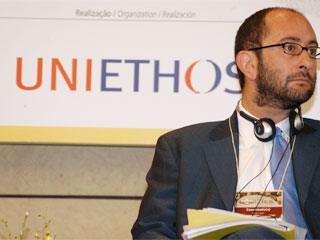Debate on Global Compact shows CSR dilemmas in the five continents
A true engagement of companies with sustainable development is still rare to find
"Companies must be more than a green façade". Linda Funnell-Milner, director of Corporate ResponseAbility, closed the plenary session with this comment. "Advances of corporate social responsibility in the five continents". Manuel Escudero (head of Networks of UN Global Compact), Arnon Cramer (president and CEO of BSR - Business for Social Responsibility – BSR), George Mathew (founder and director of the Institute of Social Sciences in New Delhi), Daisy Kambalane (representative of the African Institute of Corporate Citizenship – AICC), and Oded Grajew (Chairman of the Advisory Board of the Instituto Ethos) also took part in the discussion.
In the first part of the plenary, Funnell-Milner and Cramer presented the difficulties Australian, American and European companies face to implement the Global Compact and the ten principles companies commit to when they decide to subscribe to it. A personal initiative of former United Nations secretary-general, Kofi Annan, the Global Compact aims to mobilize the international business community around relevant issues for the human development.
Funnell-Milner told that in Australia there are many Global Compact signatories that do not fulfill it. "We’d like to have the civil society movements Brazil has. We don’t have as many civil society environment-related actions as here", she said. Cramer agreed with Funnell-Milner and said that companies and governments need voluntary initiatives, such as the Global Compact, so a dialogue can be established between them.
In the first part of the plenary, George Mathew and Daisy Kambalane presented the dilemmas faced by India and South Africa along the implementation of the Global Compact principles.
According to Mathew, one of the problems identified during the introduction of the initiative in India was the fact that companies were more concerned about doing social marketing than taking socially responsible actions. "Unfortunately, very few of the 140 affiliates of multinational companies operating in the country are concerned about contributing to sustainable development. In fact, their projects are market-oriented."
Having a similar problem in Africa, Kambalane explained that one of the contributing factors is the lack of measures to demand a sustainability-oriented approach instead of a profit-oriented one. She told the situation only improved when a conduct agreement was signed between the government and the companies. "After signing this agreement, which demands transparency, the companies changed their attitude. As the Global Compact was publicly signed, the population can more easily know whether the company is complying or not."
Although the situation has improved in Africa due to the Global Compact, "the continent still has several challenges to overcome so it can no longer be, for instance, the world region where the rate of HIV-infected people increases the most", Kambalane stressed. In her opinion, one way to solve this and other issues, such as poverty and violence, is to integrate the companies into this context. "The Global Compact has encouraged the business sector to become agents of change even in conflict areas. When companies become aware of the African people’s conflicts, they usually acquire a different perception of the needy population’s reality and, consequently, take actions to avoid being held hostage to such conflicts."
Fonte: Instituto Ethos

> Petrobras Watch the Petrobras coverage
© Copyright 2007, Instituto Ethos de Responsabilidade Social Empresarial. Todos os direitos reservados






